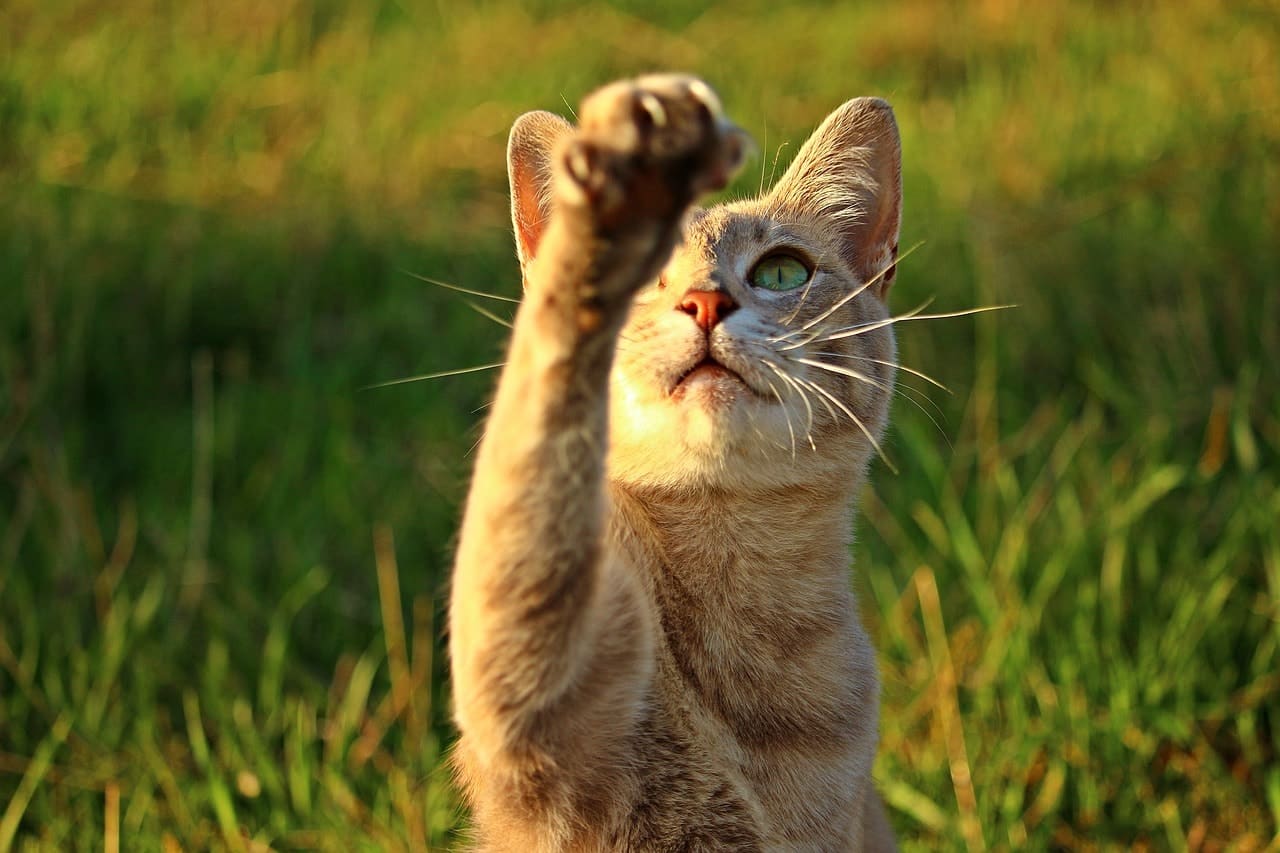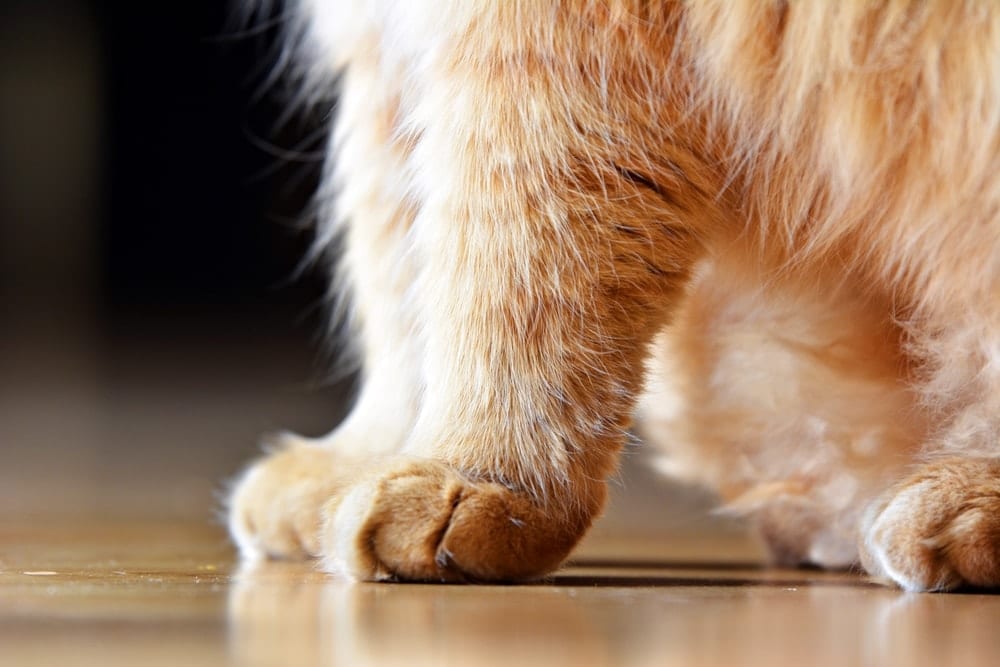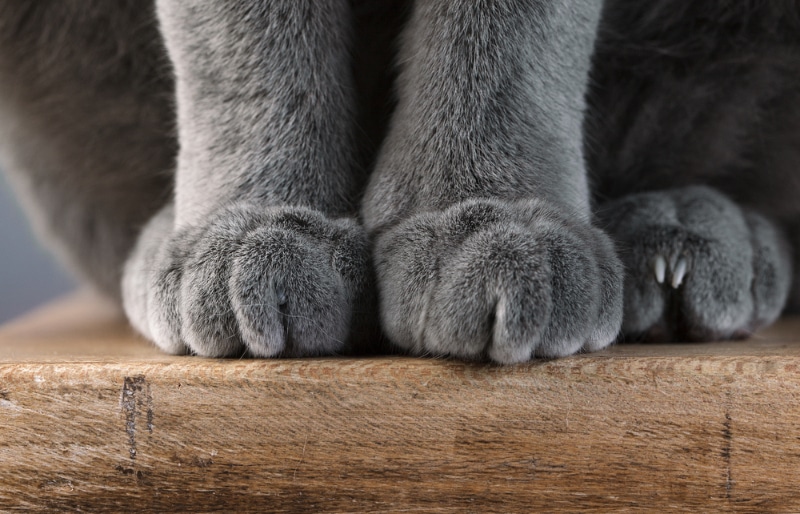Cats are relatively odor-free pets compared to dogs, if you don’t count their litter box! However, that doesn’t mean cats don’t occasionally give off strange smells. For example, some cat owners may notice their pet’s feet smell like Fritos or corn chips.
This is usually caused by bacteria present on the cat’s feet. Healthy cat feet don’t usually smell like Fritos (unlike dog’s), so let’s look into why they might and answer frequently asked questions about this phenomenon.

The Facts About “Frito Feet” in Cats
As a rule, “Frito feet” is much more common in dogs than cats. Our canine friends generally spend more time getting wet, dirty, and exploring the outdoors than cats. The most common cause of paws that smell like corn chips is directly related to these adventures.
The yeasty Frito smell on your pet’s paws usually comes from bacteria that occur naturally on the skin or are picked up in the environment. The bacteria most commonly to blame for the frito smell are Pseudomonas and Proteus species. Your cat can make the smell worse by licking their feet because their mouths also contain a lot of bacteria.
Cats and dogs sweat through their paws, so the smell is usually nothing more than sweat mixed with microbes from the environment and your cat’s mouth from trying to clean themselves.
However, sometimes Frito feet can get worse, and this might signify a problem. Dental disease and associated halitosis is common in cats, and they may transfer bacteria and smelly odors to their paws by licking them. Cats with allergies or who are stressed tend to overgroom, which will contribute to their feet remaining moist. Moist, warm environments encourage the overgrowth of bacteria and yeasts.
Your cat’s feet could also smell because they’ve walked in something nasty in the garden, although this doesn’t tend to smell like corn chips so much!


Frequently Asked Questions (FAQ)
Can Indoor Cats Get Frito Feet?
As mentioned, dogs are more prone to Frito feet because they usually spend more time outdoors than cats, getting dirty and wet feet. Outdoor kitties may be more prone to feet that smell like corn chips, but they can occur in indoor cats, too, particularly those that suffer from stress-related skin conditions or allergies.
Bacteria grow best in warm, damp environments, and houses are often quite toasty.
Indoor cats can still get their paws wet by playing in water bowls or even cleaning themselves. If your cat does develop yeasty-smelling paws, it can happen no matter where they spend their time.
Are My Cat’s Feet More Likely to Smell Like Fritos at a Certain Time of Year?
Cats, especially indoor ones, can develop Frito feet at any time. Again, this is related to the warm environment of a human house, where ideal conditions for bacterial growth are present. Cats that are atopic (allergic to environmental allergens such as pollen) are more likely to show signs of Frito feet in the spring and summer when the pollen count is high.

Should I Worry if My Cat’s Feet Smell Like Fritos?
The bacteria that causes the Frito smell occurs naturally on the skin of dogs and cats. Because it’s less common to notice the smell in cats, feet that smell like Fritos could indicate a medical problem. Look for other signs that your cat is having skin or coat issues, such as:
- Frequent licking of the paws
- Saliva stained paws
- Redness
- Hair loss
- Sores, discharge, or crusty paws
If you notice any of these issues, consult your veterinarian. Your vet can also help you manage your cat’s oral health if the smelly paws are related to dental disease.
Can I Keep My Cat’s Feet from Smelling Like Fritos?
You won’t necessarily be able to prevent all cases of Frito feet, but keeping your cat’s feet clean and dry will help. You can keep them up to date with parasite preventatives to prevent excessive licking, manage any stressors in the house that may be causing your cat to overgroom, check your cat’s claws aren’t too long which may be causing injury or irritation, and follow your vet’s recommendations for preventative dental care.
Although cats are famously clean animals, even the best self-groomers need an occasional wipe-down. We recommend Hepper's Wash Wipes because they're gentle on skin but effective on dirt and grime. These USA-manufactured premium wipes have a hypoallergenic formula made with moisturizing natural ingredients to keep your cat's skin and fur happy and healthy. At Catster, we’ve admired Hepper for many years and decided to take a controlling ownership interest so that we could benefit from the outstanding designs of this cool cat company!

Conclusion
A cat’s feet can smell like Fritos due to bacteria on the skin, dental disease leading to odor transfer when cleaning, or because they’ve stepped in something nasty. This condition is more common in dogs than cats and may indicate a problem in your kitty. You can look for other signs of skin infection or disease and talk to your vet to help you resolve the issue.
Featured Image Credit: Nailia Schwarz, Shutterstock









